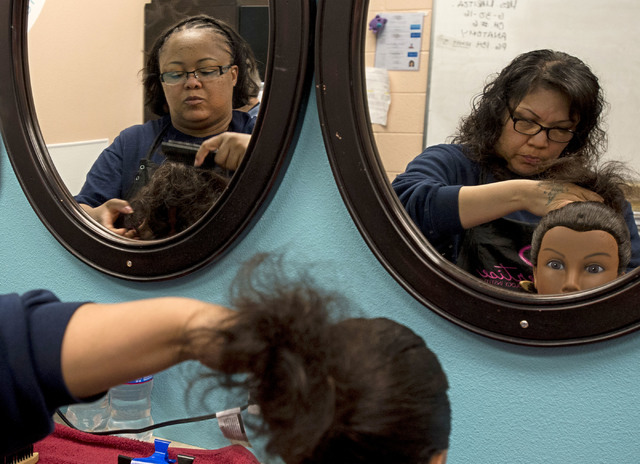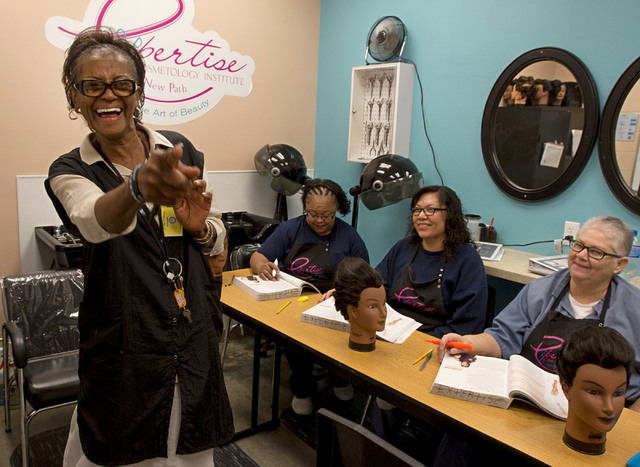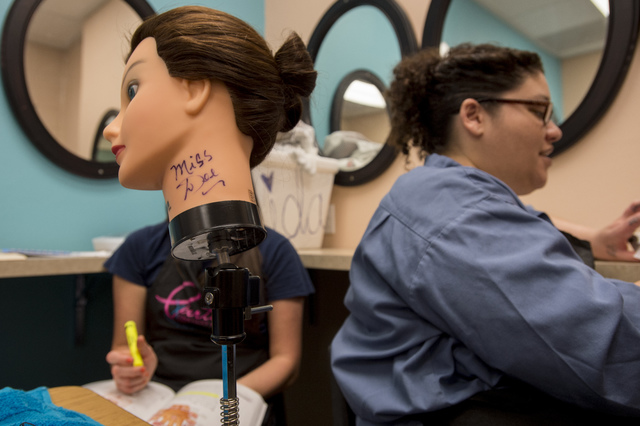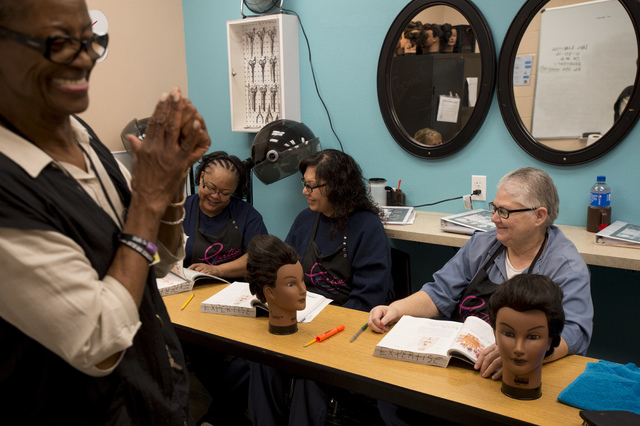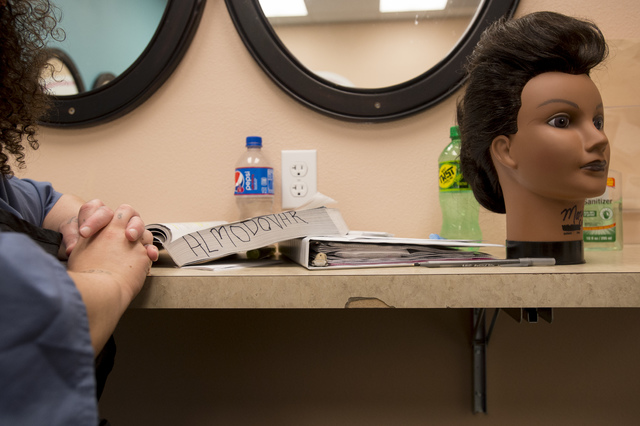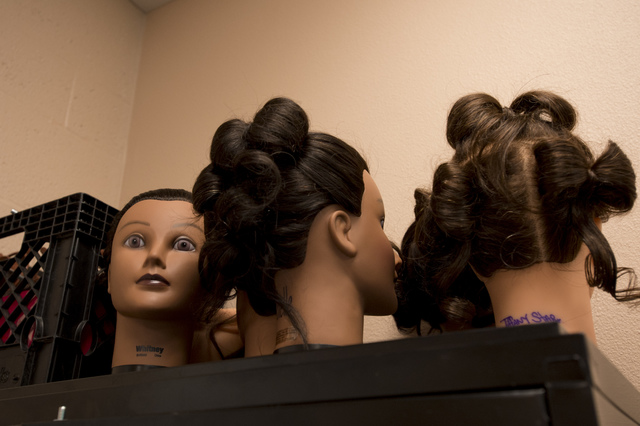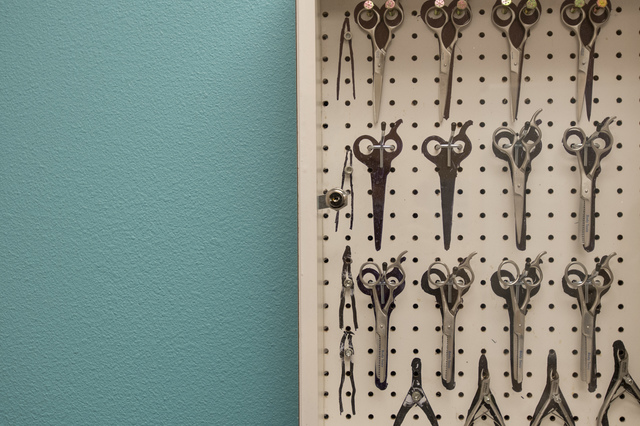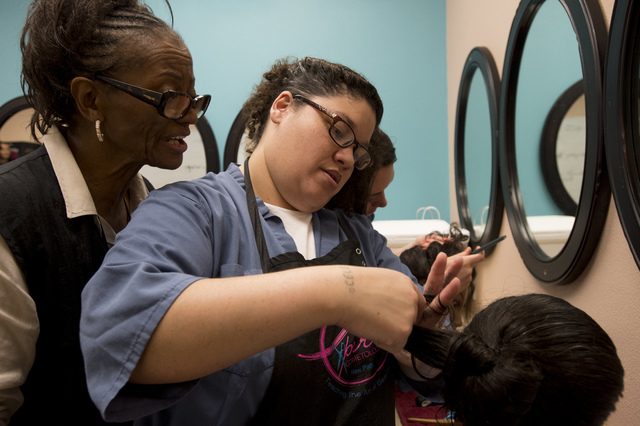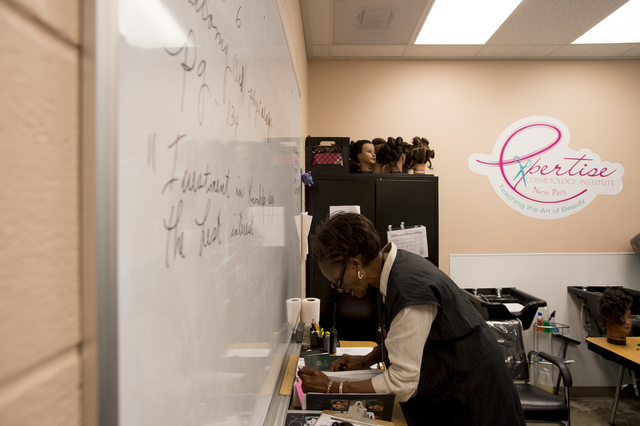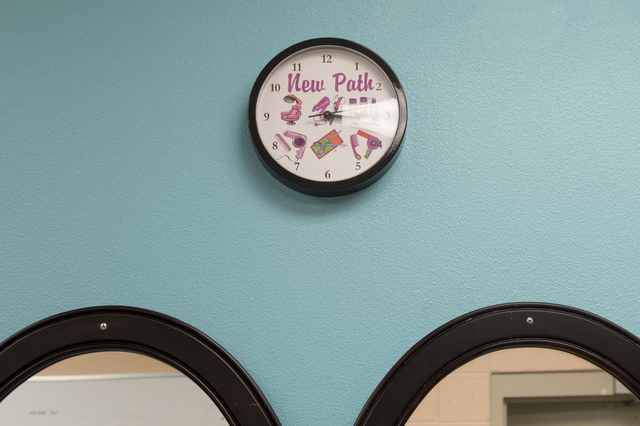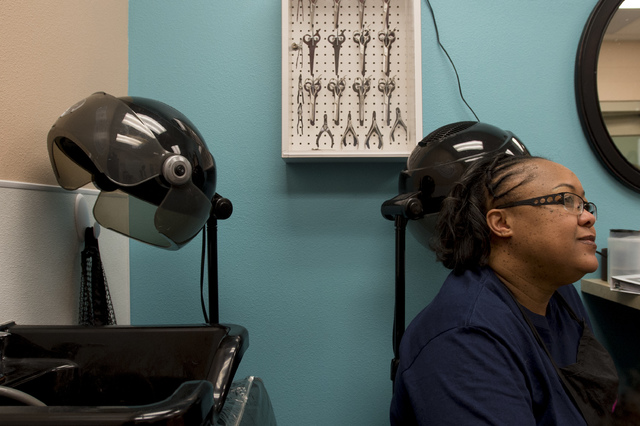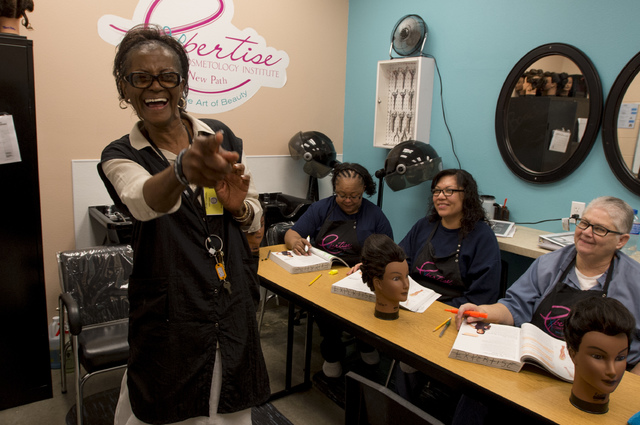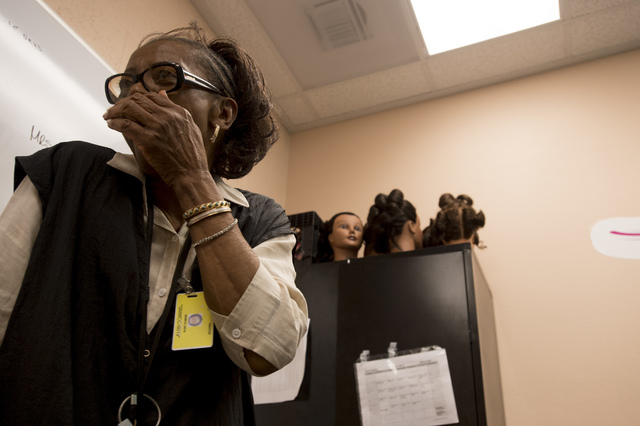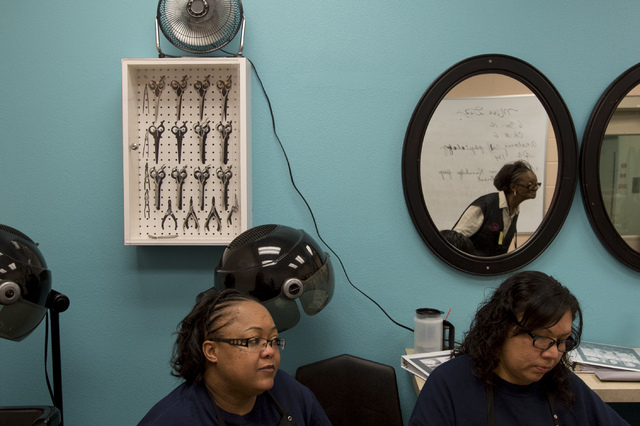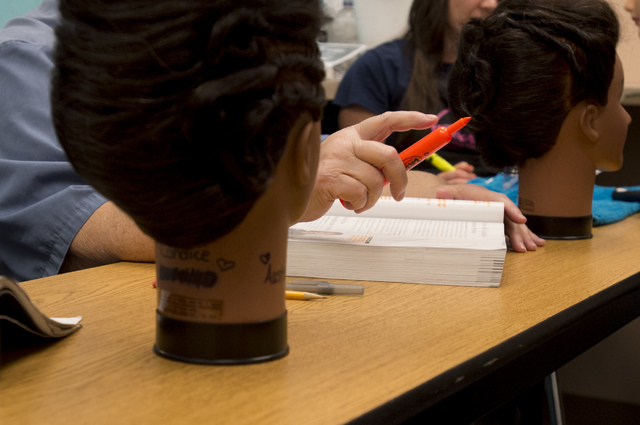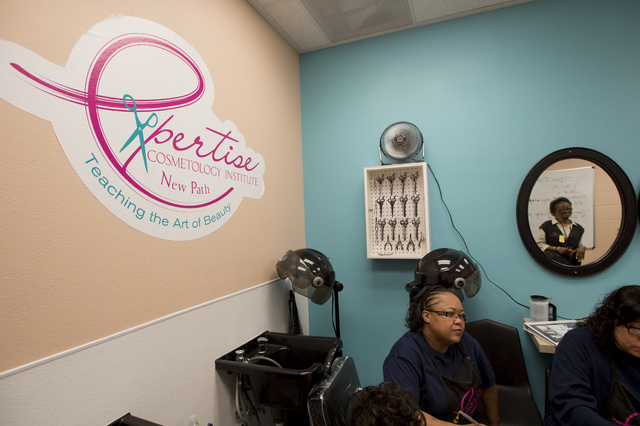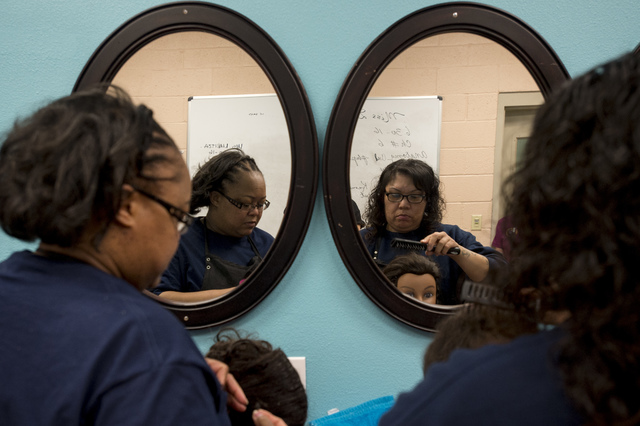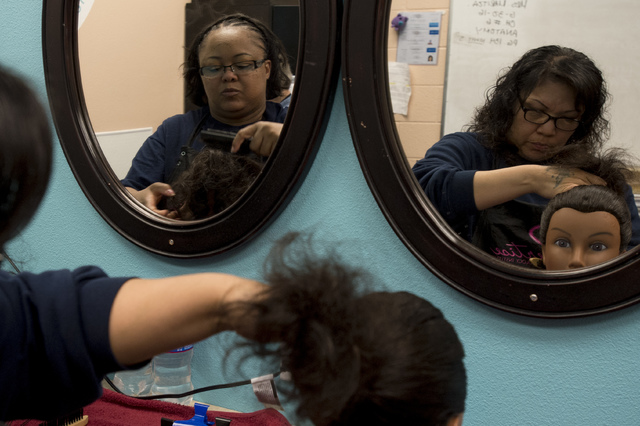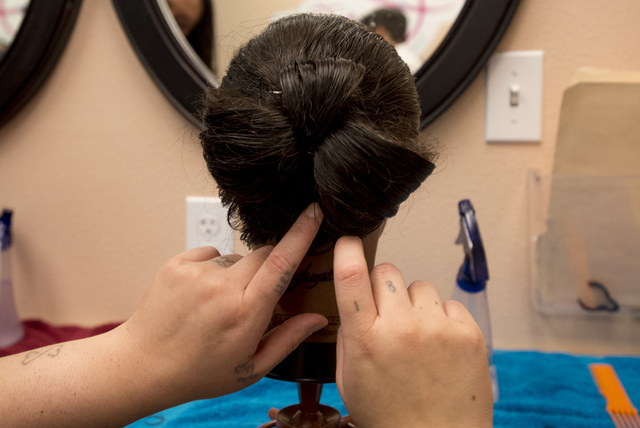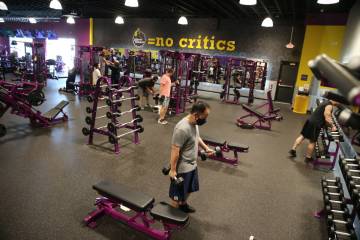Prison beauty school in North Las Vegas offers female inmates hope for new start
For Kimala Kimble, the opportunity to learn a new skill while in prison — and its promise of a new beginning — came at the right time.
“I was losing a bit of hope,” Kimble said inside Florence McClure Women’s Correctional Center where she is serving time for being a habitual criminal.
“I need options,” she said. “Leaving here, I need options to make sure I can stay out of here and take care of myself and my family. I look at this as a fresh new start.”
Kimble is one of a dozen women at the North Las Vegas facility enrolled in a program that allows them to learn cosmetology skills while incarcerated.
Eligible for parole in January 2018, Kimble said she enjoys learning the detailed styles and processes involved in cosmetology. She added she hopes the course will open new opportunities for her when she is released.
The goal of the program is not only to provide a constructive, educational experience, but also to give students the background and certification to get hired once they leave the prison, Associate Warden Gabriella Garcia said.
When the 1,600-hour course ends next August, each student successfully completing it will receive a license to practice in Nevada.
“This is a big culture change for the Nevada Department of Corrections,” Garcia said of the program put in place earlier this year.
The course is one of about 25 programs offered to the 952 inmates at the correctional center. Among the other offerings are substance abuse programs and a program that partners inmates with shelter dogs.
“We’re starting small; the goal is to expand it and be able to show that this is an effective program in order for us to be able to provide this program to more inmates,” Garcia said.
After showing initial success, classes have been moved to larger rooms within the facility, with a goal of opening up the course to 50 inmates, Keast said.
FORWARD THINKING
Five days a week, two classes of six students each meet for six hours to study, take quizzes and tests, and practice hair styling, manicures and other cosmetological procedures.
Instructor Dorothy Muhammed, better known to her students as “Ms. Dee,” leads the course, which is offered in partnership with Expertise Cosmetology Institute.
Class on this day took place in a small, square room. Around the room are signs of encouragement. “Investment in knowledge pays the best interest” reads the top of the white board that fills much of one wall, and a clock above the workstations bears the words “a new path.”
The students cracked open their textbooks, broke out flash cards and studied their notes to prepare for the day’s exam, one of 32 they will take over the course of the 1,600-hour class, Muhammed said.
During the lesson, the women responded politely, answering Ms. Dee’s questions with a “Yes ma’am” or a “No ma’am.”
They practiced the “French twist” on mannequin heads bearing names such as “Conchita” and “Renata,” — each bearing a name scrawled in marker by the inmates.
There’s more to the curriculum than cuticles and cute styles; Ms. Dee also teaches the 12 women about anatomy and physiology.
When they complete the program, Muhammed said, the students can work within the cosmetology field, but also could use the course, which teaches the basics of anatomy and physiology, as a foundation for further studies that could lead to a career as a medical assistant.
After covering the circulatory system and reviewing various veins and arteries, she led the class in bits of Al Green’s “How Can You Mend a Broken Heart.”
“Tell me,” Ms. Dee sang, “how can you mend a broken heart?”
The lessons learned in the cosmetology class help with some of that mending.
‘WE AREN’T THROWAWAYS’
“This is more than lipstick and curling irons,” Michelle Brown said. “It’s for inmates to learn a trade so that when we go out, we have something that we can do.”
Brown, eligible for parole in March, is serving a sentence for grand larceny. The class, she said, is a way to avoid the routine many inmates fall into once they are released.
“We get out there and we wind up working jobs that don’t pay the bills and then fall back on old behaviors to make sure our that our rent is paid because we don’t have any other way to do it,” Brown said.
“I’ve done everything from fast food to clerical work,” she said. “Everything. Nobody wants to hire a felon … Why hire us when they can hire someone without a record who hasn’t been convicted of grand larceny?”
The work she puts into the class now behind bars will clear a path for opportunities on the outside, Brown said.
Knowing that something positive awaits her once she has served her time gives Brown hope for not only herself but also her children.
“We aren’t throwaways, you know?” Brown said, tears in her eyes. “We can contribute stuff to society too.”
She added, “We did something bad, but we’re learning from what we did. I have four daughters. I don’t ever want them ever to go in my footsteps. Not the footsteps I came here in, the ones I leave in.”
As the class continued, Muhammed reminded the women why they were there: the prospect of a different life on the outside, one with a new future.
“This is your time now, OK?” she said, pointing to the clock above the classroom. “This is a new path.”



